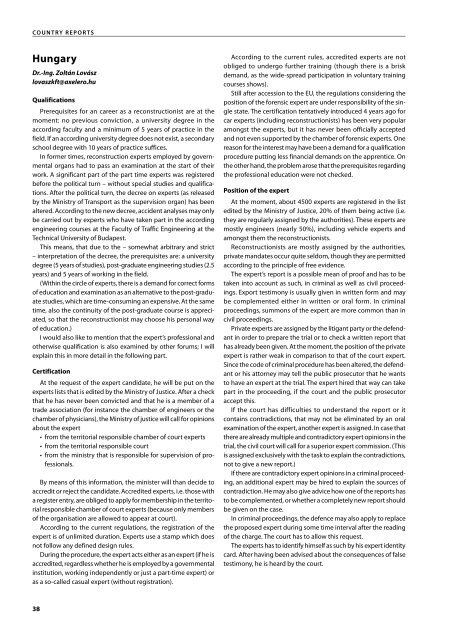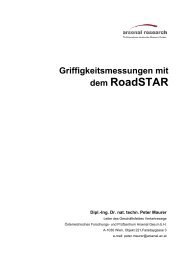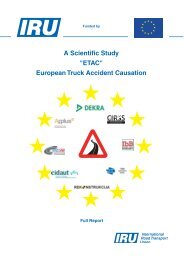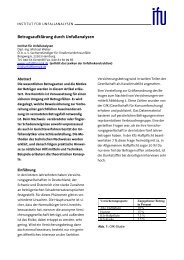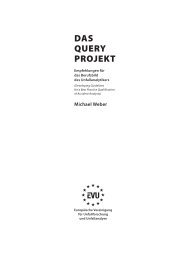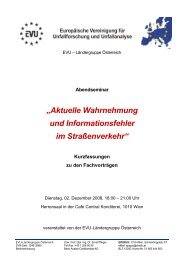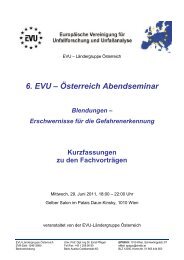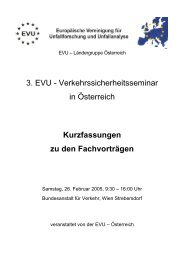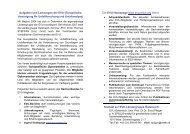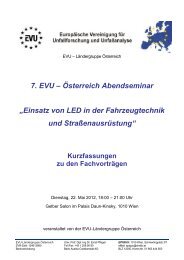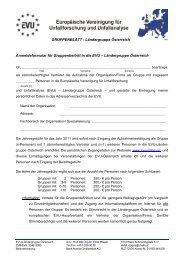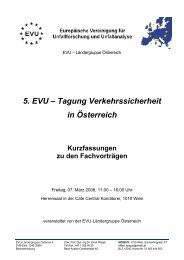THE QUERY PROJECT - European Commission - Europa
THE QUERY PROJECT - European Commission - Europa
THE QUERY PROJECT - European Commission - Europa
You also want an ePaper? Increase the reach of your titles
YUMPU automatically turns print PDFs into web optimized ePapers that Google loves.
Co u n t R y R E P o R t S<br />
hungary<br />
Dr.-Ing. Zoltán Lovász<br />
lovaszkft@axelero.hu<br />
Qualifications<br />
Prerequisites for an career as a reconstructionist are at the<br />
moment: no previous conviction, a university degree in the<br />
according faculty and a minimum of 5 years of practice in the<br />
field. If an according university degree does not exist, a secondary<br />
school degree with 10 years of practice suffices.<br />
In former times, reconstruction experts employed by governmental<br />
organs had to pass an examination at the start of their<br />
work. A significant part of the part time experts was registered<br />
before the political turn – without special studies and qualifications.<br />
After the political turn, the decree on experts (as released<br />
by the Ministry of Transport as the supervision organ) has been<br />
altered. According to the new decree, accident analyses may only<br />
be carried out by experts who have taken part in the according<br />
engineering courses at the Faculty of Traffic Engineering at the<br />
Technical University of Budapest.<br />
This means, that due to the – somewhat arbitrary and strict<br />
– interpretation of the decree, the prerequisites are: a university<br />
degree (5 years of studies), post-graduate engineering studies (2.5<br />
years) and 5 years of working in the field.<br />
(Within the circle of experts, there is a demand for correct forms<br />
of education and examination as an alternative to the post-graduate<br />
studies, which are time-consuming an expensive. At the same<br />
time, also the continuity of the post-graduate course is appreciated,<br />
so that the reconstructionist may choose his personal way<br />
of education.)<br />
I would also like to mention that the expert’s professional and<br />
otherwise qualification is also examined by other forums; I will<br />
explain this in more detail in the following part.<br />
Certification<br />
At the request of the expert candidate, he will be put on the<br />
experts lists that is edited by the Ministry of Justice. After a check<br />
that he has never been convicted and that he is a member of a<br />
trade association (for instance the chamber of engineers or the<br />
chamber of physicians), the Ministry of justice will call for opinions<br />
about the expert<br />
• from the territorial responsible chamber of court experts<br />
• from the territorial responsible court<br />
• from the ministry that is responsible for supervision of professionals.<br />
By means of this information, the minister will than decide to<br />
accredit or reject the candidate. Accredited experts, i.e. those with<br />
a register entry, are obliged to apply for membership in the territorial<br />
responsible chamber of court experts (because only members<br />
of the organisation are allowed to appear at court).<br />
According to the current regulations, the registration of the<br />
expert is of unlimited duration. Experts use a stamp which does<br />
not follow any defined design rules.<br />
During the procedure, the expert acts either as an expert (if he is<br />
accredited, regardless whether he is employed by a governmental<br />
institution, working independently or just a part-time expert) or<br />
as a so-called casual expert (without registration).<br />
According to the current rules, accredited experts are not<br />
obliged to undergo further training (though there is a brisk<br />
demand, as the wide-spread participation in voluntary training<br />
courses shows).<br />
Still after accession to the EU, the regulations considering the<br />
position of the forensic expert are under responsibility of the single<br />
state. The certification tentatively introduced 4 years ago for<br />
car experts (including reconstructionists) has been very popular<br />
amongst the experts, but it has never been officially accepted<br />
and not even supported by the chamber of forensic experts. One<br />
reason for the interest may have been a demand for a qualification<br />
procedure putting less financial demands on the apprentice. On<br />
the other hand, the problem arose that the prerequisites regarding<br />
the professional education were not checked.<br />
Position of the expert<br />
At the moment, about 4500 experts are registered in the list<br />
edited by the Ministry of Justice, 20% of them being active (i.e.<br />
they are regularly assigned by the authorities). These experts are<br />
mostly engineers (nearly 50%), including vehicle experts and<br />
amongst them the reconstructionists.<br />
Reconstructionists are mostly assigned by the authorities,<br />
private mandates occur quite seldom, though they are permitted<br />
according to the principle of free evidence.<br />
The expert’s report is a possible mean of proof and has to be<br />
taken into account as such, in criminal as well as civil proceedings.<br />
Export testimony is usually given in written form and may<br />
be complemented either in written or oral form. In criminal<br />
proceedings, summons of the expert are more common than in<br />
civil proceedings.<br />
Private experts are assigned by the litigant party or the defendant<br />
in order to prepare the trial or to check a written report that<br />
has already been given. At the moment, the position of the private<br />
expert is rather weak in comparison to that of the court expert.<br />
Since the code of criminal procedure has been altered, the defendant<br />
or his attorney may tell the public prosecutor that he wants<br />
to have an expert at the trial. The expert hired that way can take<br />
part in the proceeding, if the court and the public prosecutor<br />
accept this.<br />
If the court has difficulties to understand the report or it<br />
contains contradictions, that may not be eliminated by an oral<br />
examination of the expert, another expert is assigned. In case that<br />
there are already multiple and contradictory expert opinions in the<br />
trial, the civil court will call for a superior expert commission. (This<br />
is assigned exclusively with the task to explain the contradictions,<br />
not to give a new report.)<br />
If there are contradictory expert opinions in a criminal proceeding,<br />
an additional expert may be hired to explain the sources of<br />
contradiction. He may also give advice how one of the reports has<br />
to be complemented, or whether a completely new report should<br />
be given on the case.<br />
In criminal proceedings, the defence may also apply to replace<br />
the proposed expert during some time interval after the reading<br />
of the charge. The court has to allow this request.<br />
The experts has to identify himself as such by his expert identity<br />
card. After having been advised about the consequences of false<br />
testimony, he is heard by the court.


